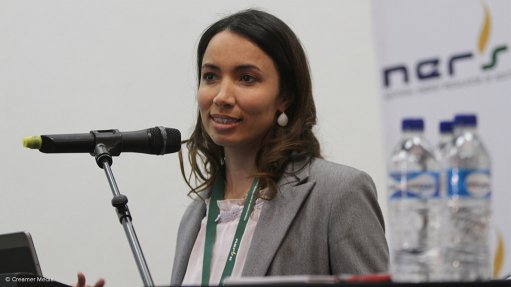
Chamber of Mines economics head Monique Mathys
Photo by: Duane Daws
JOHANNESBURG (miningweekly.com) – The imposition of an additional power tariff increase would severely jeopardise the sustainability of the South African mining industry, the Chamber of Mines warned at hearings hosted by the National Energy Regulator of South Africa (Nersa) in Johannesburg on Tuesday.
Eskom has applied for a selective reopening of the third multi-year price determination, which began on April 1, 2013 and will continue until March 31, 2018.
The utility is seeking approval to increase its 2015/16 tariff increase to 25.3%, inclusive of the 12.69% already granted for the current financial year. The application focuses primarily on securing cash to operate its diesel-fuelled generators in the Western Cape, as well as to pay for short-term contracts with independent power producers.
Chamber of Mines economics head Monique Mathys warned that the mining industry was at a “tipping point” and that further tariff increases would jeopardise the profitability of “even more mining operations”, while undermining their ability to make future investments.
The chamber estimated that 60% of gold mines and 80% of platinum operations were already lossmaking or marginal and that the proposed hike could result in 20 000 to 40 000 retrenchments in addition to those already notified.
Mining companies were also increasingly constrained in their ability to invest, owing to negative equity returns over the past five years, rising net debt and limited growth opportunities.
“[Therefore], we do not support the proposed funding mechanism through a tariff hike given the current crisis situation, where the sustainability of the majority of the sector is in question,” Mathys said, noting that electricity had been the fastest rising inflationary component in a sector where costs had surged more generally.
She argued that alternate funding mechanisms were required to address negative economic impacts, including “traditional shareholder recapitalisation methods”.
Sibanye Gold’s Peter Turner was equally strident in his opposition to Eskom’s application, arguing that a further increase “would cripple the South African gold mining industry”.
He said “unsustainable electricity price increases” would lead to diminished operating performance, the early closure of mines, job losses and reduced capital investment.